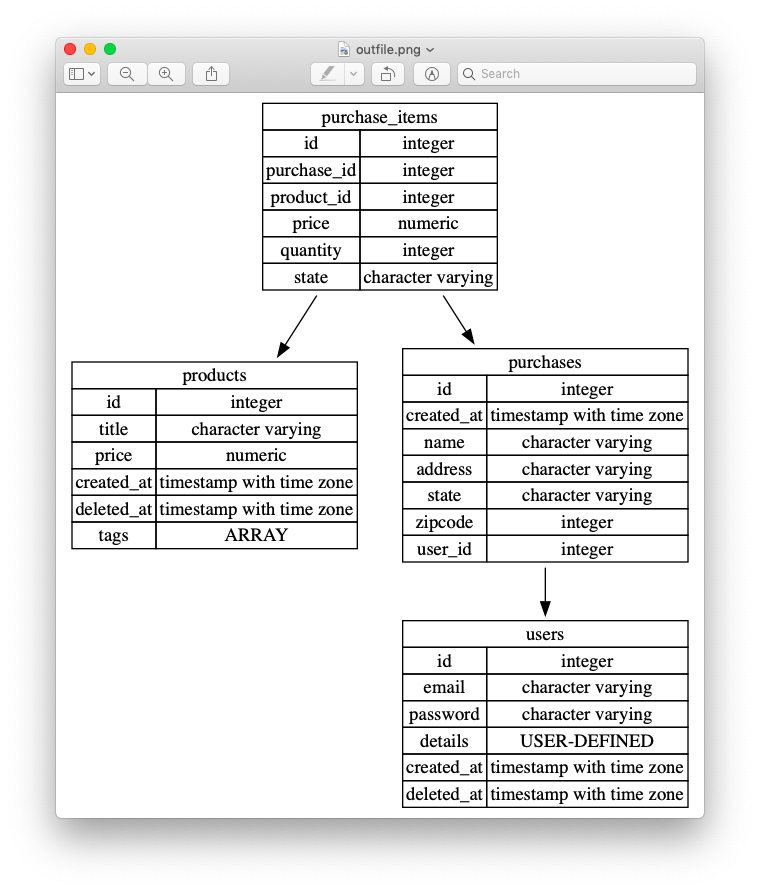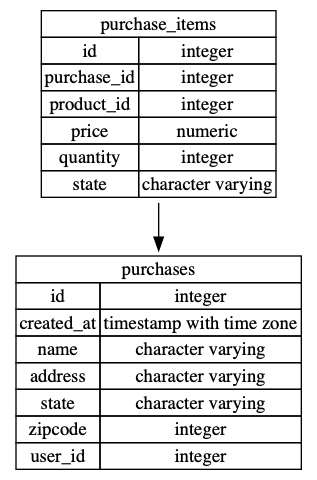dbdot is a command line tool that generates DOT description from postgres database schema.
dbdot is compiled to platform specific binary, so all you need is the right binary for your machine. Grab the appropriate binary for your architecture from the latest release here.
$ ./dbdot -dbname=pgguide -user=kewluser [16:33:31]
digraph {
node[label=<<TABLE BORDER="0" CELLBORDER="1" CELLSPACING="0"><TR><TD colspan="2">products</TD></TR>[<TR><TD>id</TD><TD>integer</TD></TR> <TR><TD>title</TD><TD>character varying</TD></TR> <TR><TD>price</TD><TD>numeric</TD></TR> <TR><TD>created_at</TD><TD>timestamp with time zone</TD></TR> <TR><TD>deleted_at</TD><TD>timestamp with time zone</TD></TR> <TR><TD>tags</TD><TD>ARRAY</TD></TR>]</TABLE>>,shape=plaintext] n1;
node[label=<<TABLE BORDER="0" CELLBORDER="1" CELLSPACING="0"><TR><TD colspan="2">purchase_items</TD></TR>[<TR><TD>id</TD><TD>integer</TD></TR> <TR><TD>purchase_id</TD><TD>integer</TD></TR> <TR><TD>product_id</TD><TD>integer</TD></TR> <TR><TD>price</TD><TD>numeric</TD></TR> <TR><TD>quantity</TD><TD>integer</TD></TR> <TR><TD>state</TD><TD>character varying</TD></TR>]</TABLE>>,shape=plaintext] n2;
node[label=<<TABLE BORDER="0" CELLBORDER="1" CELLSPACING="0"><TR><TD colspan="2">users</TD></TR>[<TR><TD>id</TD><TD>integer</TD></TR> <TR><TD>email</TD><TD>character varying</TD></TR> <TR><TD>password</TD><TD>character varying</TD></TR> <TR><TD>details</TD><TD>USER-DEFINED</TD></TR> <TR><TD>created_at</TD><TD>timestamp with time zone</TD></TR> <TR><TD>deleted_at</TD><TD>timestamp with time zone</TD></TR>]</TABLE>>,shape=plaintext] n3;
node[label=<<TABLE BORDER="0" CELLBORDER="1" CELLSPACING="0"><TR><TD colspan="2">purchases</TD></TR>[<TR><TD>id</TD><TD>integer</TD></TR> <TR><TD>created_at</TD><TD>timestamp with time zone</TD></TR> <TR><TD>name</TD><TD>character varying</TD></TR> <TR><TD>address</TD><TD>character varying</TD></TR> <TR><TD>state</TD><TD>character varying</TD></TR> <TR><TD>zipcode</TD><TD>integer</TD></TR> <TR><TD>user_id</TD><TD>integer</TD></TR>]</TABLE>>,shape=plaintext] n4;
n2->n1;
n2->n4;
n4->n3;
}
$ ./dbdot -dbname=pgguide -user=kewluser > test.dot && dot -Tpng test.dot -o outfile.png && open outfile.png
Above command pipes the DOT description into test.dot and invokes dot cli tool to transform test.dot to a outfile.png. Here's what outfile.png looks like:
./dbdot -dbname=pgguide -user=kewluser > test.dot --whitelist=purchase_items,purchases && dot -Tpng test.dot -o outfile-whitelisted.png && open outfile-whitelisted.png
Here's what outfile-whitelisted.png looks like:
dbdot currently supports the following flags:
-W ask for password
-dbname string
dbname for which you want to generate dot file
-host string
database host (default "localhost")
-port uint
database port (default 5432)
-schema string
schema name (default "public")
-sslmode
enable sslmode for postgres db connection
-user string
username of postgres db
-whitelist string
comma separated list of tables you want to generate dot file for
Here's some features I would like to have for this project:
- Support connection string. What happens if the user doesn't have access to db?
- Add support for more db types.
- Prettify output.
- Add ability to whitelist columns in a table. Users should be able whitelist columns per table. But this starts getting into territory of language design. i.e. what kind of cli syntax should dbdot support. Hence this is the last item in my list.
A while back I wanted a simple tool that would just spit out schema for tables that I wanted. A lot of tools I found were way too powerful, requiring a zillion installation and configuration. This inspired me to write a simple self contained tool that was laser focused on just reading schema and spitting out DOT.

